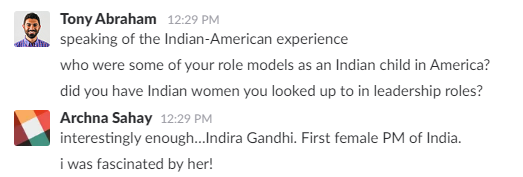Why City Hall’s startup ace Archna Sahay needs you to start talking about diversity
 August 29, 2016
Category: Featured, Medium, People
August 29, 2016
Category: Featured, Medium, People
For a country that has historically prided itself on being a racial and cultural melting pot, Americans are not great at having productive conversations about diversity and inclusion. Archna Sahay has an idea as to why that might be.
“We don’t have a language for it yet,” said Sahay, Philadelphia’s director of entrepreneurial investment. “There’s no common language for us to have that conversation.”
After immigrating to the United States from India at 5 years old, Sahay spent three months in English as a Second Language classes. She already knew how to speak the language, but it didn’t stop Americans from being surprised by how eloquently she could speak it.
“When you’re a kid, you don’t know you’re dressing funny or that your name is funny,” she said. “You don’t know you’re different until someone tells you. The only limitations out there are the ones that sometimes I feel the world puts on you. If the pathways and opportunities don’t exist for, you’ll only reach so much of your potential.”
Thirty years later, Sahay has earned herself a leadership position at the forefront of Philadelphia’s innovation economy — not only as a woman, but as a woman of color.
The startup ace took to Technical.ly‘s public Slack channel recently to field questions about startups, diversity and inclusion for Generocity’s “leaders of color” series.
“I think it is really interesting that you have a person of color and a woman leading the efforts of this extremely influential sector in Philadelphia,” she said of her role in helping to level the playing field for entrepreneurs of color. “That sends a very strong signal. It’s really great that both the Nutter and Kenney administrations [have been able to] see and value that.”
Sahay, who spent the first part of her career working in finance, said the public sector is plagued by many of the same fundamental diversity and inclusion problems as the private sector: Both do a “great job” of onboarding diverse talent, but neither are nearly as proficient at retaining and developing that talent.
Why can’t the systems that are so great at retaining and developing white male talent be used to retain and develop that of women and people of color?
“I want some of that success too!” said Sahay on Slack. “That model clearly works. Let’s build out a model for other demographics.”
By not talking about diversity and addressing the needs of marginalized communities and diverse populations, Sahay said, the world is missing out on “so many innovations and solutions” from people who — well, aren’t white and male.
But first, people need to learn how to actually talk about diversity productively, and that doesn’t just mean having more representation in rooms where decisions are being made (though, that’s a great start) — it means dropping preconceived notions and “natural” biases.
“I am an immigrant. I am South Asian. I am a woman. I am a Philadelphian. So, the rooms I go into, it is important to me that there is representation for all of those parts of me,” said Sahay. “I do not prescribe to the notion that [those rooms] should always be all women or all one particular demographic.”
There are ways for organizations, businesses and institutions to help further that progress. For instance, the Department of Commerce (which oversees Sahay’s position) has been focusing on hiring multilingual staff to “further support the immigrant population in Philadelphia.”
"I am fascinated by all women from every background who run things, because I know how hard that is as a woman." https://t.co/mbwYqy1qND
— Technical.ly Philly (@TechnicallyPHL) August 25, 2016
But ultimately, Sahay said, those organizations, businesses and institutions need to make an effort to engage with underrepresented communities.
“Go to them” she said. “Ask the community how they want to be engaged with.”
It’s not that hard.
Trending News













